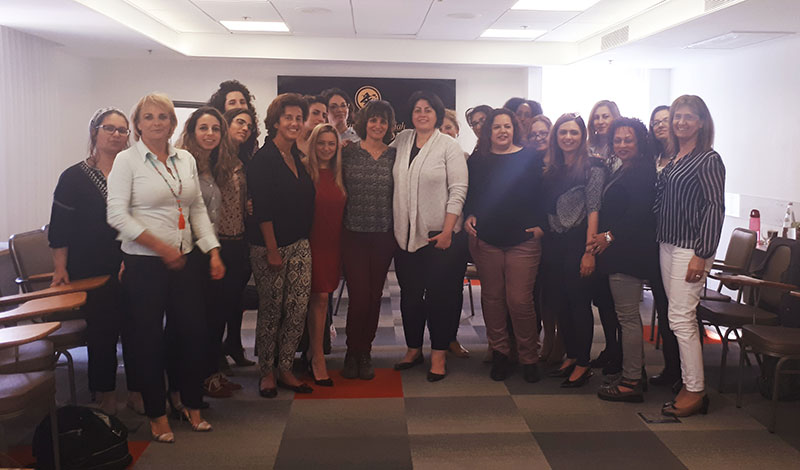MEDIA INQUIRIES:
Contact: Renee Young
Hadassah National Public Relations
ryoung@hadassah.org
212.303.8140
MEDIA INQUIRIES:
Rabbi Ellen Flax
Director, The Hadassah Foundation
hadassahfoundation@hadassah.org
212.451.6245
Taub Center for Social Politics and ANU Receive First-Time Grants
NEW YORK, June 19, 2018 – The Hadassah Foundation, which invests in social change to empower girls and women in Israel and the United States, announces $330,000 in grants to twenty Israeli organizations that enhance economic opportunities for women in Israel, according to Julie Morris, Chair of The Hadassah Foundation, now in its 18th year of grant giving.
First-time grantees ANU received $25,000 to provide strategic and technological tools to the members of the Women’s Activist Forum to help them run more effective social and advocacy campaigns. The Taub Center for Social Policy Studies in Israel received $15,000 to write a report that will focus on the differences in women’s and men’s retirement income in Israel in comparison to other countries, and how this issue, alongside growing life expectancy, may impact the well-being of elderly women in Israel.
In addition to the two first-time grantees, the Foundation also awarded “sustaining” grants for the sixth consecutive year to long-term grantees that have played a particularly critical role in promoting the economic security of women in Israel: The Center for Women’s Justice; Economic Empowerment for Women; Itach-Maaki--Women Lawyers for Social Justice; and The Ruth and Emmanuel Rackman Center at Bar Ilam University.
Hadassah Foundation Chair Julie Morris states: ““Our grantees are making a real difference in the lives of Israeli women, enabling them to become more economically secure, advocating for their rights, and championing their voice in the public sphere.”
Orit Sulitzeanu, Executive Director of the Association of Rape Crisis Centers in Israel, which received a $25,000 grant to train and create a forum, for company ombudsmen charged with enforcing Israel’s anti-sexual harassment code in the workplace, notes: “The ombudsmen charged with preventing sexual harassment in the State of Israel play a difficult role, often lacking the tools and highly-specialized knowledge to deal with the complex dilemmas facing them in these professions. They often lack the organizational support to implement serious change, finding themselves unable to provide protection for women who are sexually assaulted at work. The project of establishing an ombudsman's forum focused on the prevention of sexual harassment, one that provides the tools and training to do so, meets the critical need of protecting women in the workplace and empowering them mentally and economically. These goals are consistent with the goals of the Hadassah Foundation to empower women and girls.”
The Hadassah Foundation is a philanthropic pioneer in the fields of improving economic security for low-income Israeli women and developing leadership and self-esteem programs for adolescent Jewish girls and young women in the United States. Since 1999, the Foundation has made nearly $8.3 million in grants to almost 100 nonprofit organizations devoted to improving the lives of girls and women.
In 2017, the Foundation made grants totaling $500,000—it awarded $335,000 to 22 Israeli organizations which work to support Israeli women from all walks of life, as well as $165,000 to seven organizations in the United States as part of its initiative to strengthen leadership development opportunities for young Jewish women.
The 2018 grants were awarded to the following Israel-based organizations:
Legal Aid
- The Ruth and Emanuel Rackman Center at Bar Ilan University, $5,000 (Sustaining Grant): Provides legal counsel to women seeking a divorce. It works proactively to improve policy and practice by educating future family lawyers to safeguard women’s rights and advocating for changes in Israeli family law.
- Center for Women’s Justice, $5,000 (Sustaining Grant): Pursues precedent-setting litigation and legal advocacy on behalf of women who have suffered unjust treatment, discrimination, or whose basic human rights have been infringed upon when seeking a divorce.
- Itach-Maaki—Women Lawyers for Social Justice, $5,000 (Sustaining Grant): Public interest law organization working on behalf of low-income Israeli women. Itach--Maaki helps women to file employment-related lawsuits and form peer support groups and educates the public about issues affecting women.
- Tmura--The Israeli Center for Equality, $20,000--Females comprise only 2% of the prisoner population in Israel, and as a result, the unique needs of women in, and as they leave prison, are overlooked. With Foundation funding, Tmura will provide female ex-convicts with training about their rights, teach them how to regain financial control of their lives, and access government benefits.
Policy Education and Coalition Building
- Adva, $10,000: For the Negev Forum of Women Business Leaders, which aims to increase the economic power of Bedouin and Jewish businesswomen from more than 20 Negev communities, who will receive training and mentoring so they can plan and implement civic initiatives that increase women’s economic opportunities.
- The Israel Women’s Network, $24,000: The Israel Women’s Network (IWN), in cooperation with nine other Israeli feminist organizations, is working to preserve the economic well-being of mothers with young children during divorce proceedings.
- New Israel Fund, Shatil, $15,000: For the Advancing the Rights of Women in Public Housing program, which aims to protect the rights of single mothers in public housing—an estimated 77% of the families in public housing are headed by single women—and expand eligibility criteria so that more such families can get housing support.
- Yedid, $8,000: For the Single Mothers for Change program, which strivesto provide greater economic security for low-income single mothers. Working with a network of more than 800 low-income single female parents, YEDID will educate and advocate for public policies to improve the economic security of single parents and their children, focusing specifically on Israel’s child-support law.
Workplace Discrimination
- The Association of Rape Crisis Centers in Israel, $25,000: For an initiative to train and organize the ombudsmen at Israeli companies and organizations so they can better handle workplace sexual harassment complaints.
- Merchavim, $15,000: For the Arab Teacher Integration in Jewish Schools Initiative, which places Arab Israelis trained as teachers—the vast majority of whom are female—in Jewish Israeli schools. This program aims to reduce the high level of unemployment of female teachers in the Arab sector, address a shortage of teachers in Jewish Israeli schools, and promote intergroup relations.
Asset Building
- Economic Empowerment for Women, $5,000 (Sustaining Grant): For the promotion of asset development among low-income women who manage microenterprises, based on the U.S. model of the Individual Development Account.
- Taub Center for Social Policy Studies in Israel, $15,000 (First time Grantee): The Taub Center received funds to write a report that will focus on the differences in women’s and men’s retirement income in Israel in comparison to other countries, and how this issue, alongside growing life expectancy, may impact the well-being of elderly women in Israel.
- Yozmot Atid, $20,000: Yozmot Atid received funds for a microfinance and business development project that will enable 50 women living near or at the poverty level to create small businesses through microloans provided by Leumi Bank and through individual business coaching.
Business Training & Entrepreneurship
- Microfy, $13,000: Microfy received support for a women’s business forum for nascent business owners from South Tel Aviv.
- Jasmine, $25,000: Jasmine received support for its "Zinuk" program, which helps Jewish and Arab Israeli women who own or run small businesses that are between 2 and 6 years old to expand their operations and increase their profits.
Vocational Training and Job Placement
- ITWorks, $25,000: ITWorks received funds for its high-tech vocational training and placement program for 60 low-income single mothers.
- Tishreen, $25,000: Tishreen received support for a job readiness program for Arab Israeli women from the Southern Triangle region.
- Turning the Tables, $20,000: Turning the Tables received funds for the Yotsrot Atid program, which provides Israeli women exiting prostitution with vocational training, work experience, and employment in the fashion trades.
Leadership Development
- ANU, $25,000 (First time Grantee): ANU received funds to provide strategic and technological tools to the members of the Women’s Activist Forum, to help them run more effective social and advocacy campaigns.
- WEPOWER, $25,000: WEPOWER received funds for a program that encourages women completing their first five-year term as city council members to run for a second term, since, traditionally, half of such women do not run for second term.

About The Hadassah Foundation
The Hadassah Foundation, founded in 1998 by Hadassah, the Women’s Zionist Organization of America, is an investor in social change to empower girls and women in Israel and the United States. For more information, visit www.hadassahfoundation.org.
Hadassah, the Women’s Zionist Organization of America, Inc. (HWZOA) is the largest Jewish women’s organization in the United States. With 330,000 members, associates and supporters Hadassah brings Jewish women together to effect change and advocate on critical issues such as medical care and research and women's empowerment. Through the Hadassah Medical Organization's two hospitals, the world-renowned trauma center and the leading research facility in Jerusalem, Hadassah supports the delivery of exemplary patient care to over a million people every year. HMO serves without regard to race, religion or nationality and earned a Nobel Peace Prize Nomination in 2005 for building “bridges to peace” through equality in medical treatment. For more information, visit my.hadassah.org.



